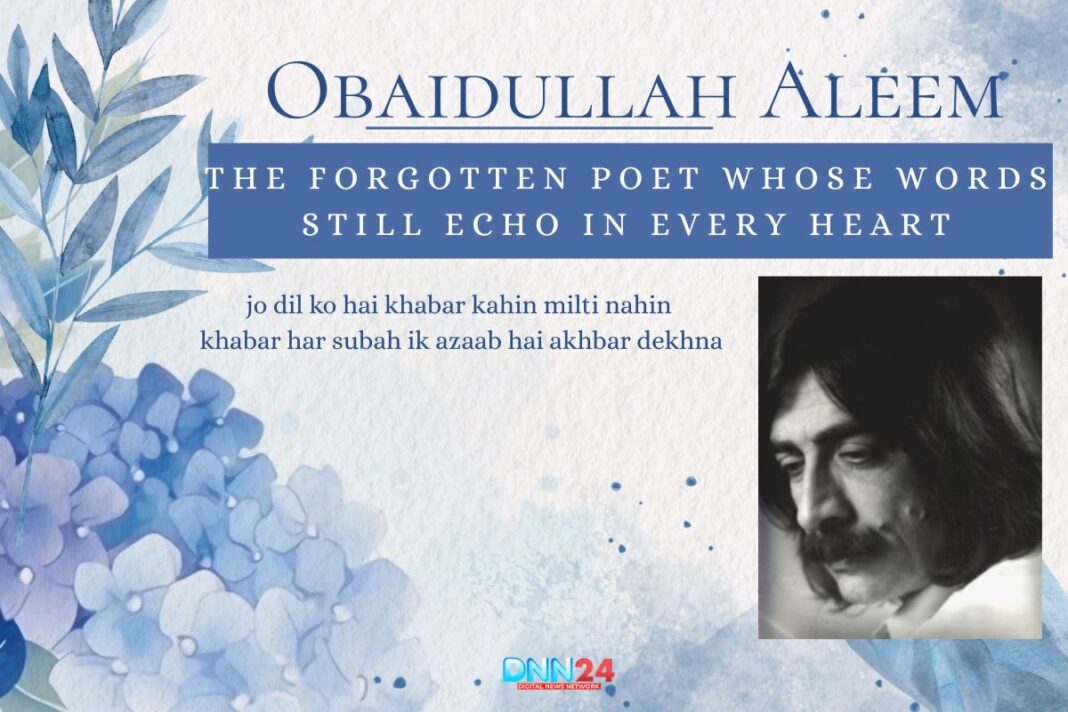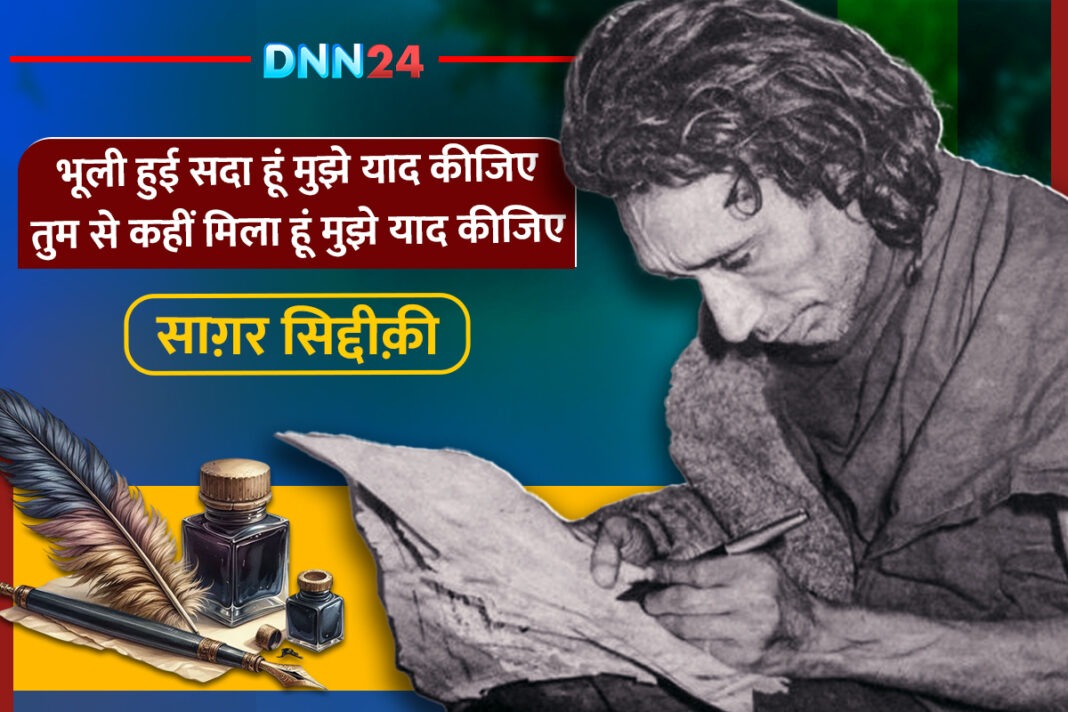Obaidullah Aleem came into this world in 1939 in Bhopal, where morning prayers mixed with the rustle of old manuscripts. His family carried the gentle blood of Kashmir in their veins, but history had other plans. When partition tore through the subcontinent like a sharp knife through silk, young Aleem found himself walking the dusty roads to Karachi with his family. The boy who lost his first home would spend his entire life writing about longing.
aziiz itna hi rakho ki ji sambhal jae
Obaidullah Aleem
ab is qadar bhi na chaho ki dam nikal jae
In Karachi, everything felt new and strange. The salty air from the Arabian Sea, the calls of street vendors, and the mix of languages on every corner became the backdrop of his growing years. His father brought stories of their Sialkot roots, where great poets like Allama Iqbal once walked. These tales planted the first seeds of poetry in young Aleem’s heart.
aankh se door sahi dil se kahan jaega
Obaidullah Aleem
jaane wale tu hamein yaad bahut aayega
He was a quiet child who watched more than he spoke, collecting memories like other children collect marbles. At the University of Karachi, he chose to study Urdu literature, not just as a subject but as a way to understand the music hidden in everyday words. Even then, friends noticed something special about how he looked at the world – as if he could see beauty hiding in the most ordinary moments.
Television Days and First Recognition: The Birth of a Literary Star
The 1960s brought television to Pakistan, and with it came new dreams. Aleem joined Pakistan Television as a producer, where he learned that stories could travel through wires and reach homes across the country. During these busy days, poetry grew inside him like a secret garden. In 1970, he married Nigar Yasmin, finding in her a companion who understood his silences as well as his words.
khwab hi khwab kab talak dekhun
Obaidullah Aleem
kaash tujh ko bhi ik jhalak dekhun
Then came 1974, the year that changed everything. His poetry collection “Chand Chehra Sitara Ankhein” (Moon Face, Star Eyes) won the prestigious Adamji Prize, suddenly making him famous across Pakistan and India. People began singing his ghazals in drawing rooms and at wedding celebrations. Renowned singers like Mehdi Hassan and Farida Khanum gave voice to his verses, carrying them into hearts everywhere. His lines became part of daily conversations – lovers whispered them to each other, and mothers sang them as lullabies.
hawa ke dosh pe rakkhe hue charagh hain hum
Obaidullah Aleem
jo bujh gaye to hawa se shikayaten kaisi
But fame felt strange to Aleem. He remained humble, often surprised when people recognised him on the street. His friendship with fellow poet Jaun Elia comforted him during these overwhelming times. Together, they would sit for hours, discussing the responsibility of touching people’s hearts through poetry. Success had found him, but Aleem always remembered the quiet boy from Bhopal who once felt like a stranger in his land.
dua karo ki main us ke liye dua ho jaun
Obaidullah Aleem
vo ek shakhs jo dil ko dua sa lagta hai
The Dark Years: When Society Turned Away
Life has a way of testing those who dare to dream. In 1978, everything changed for Obaidullah Aleem. General Zia ul Haq’s military government brought strict religious laws that made life difficult for minorities, including members of the Ahmadi community like Aleem. Suddenly, the poet who had been celebrated everywhere found doors closing in his face. Pakistan Television, where he had worked for years, could no longer keep him. Friends became distant, afraid to be seen with him.
ab to mil jao hamein tum ki tumhari khatir
Obaidullah Aleem
itni door aa gaye duniya se kinara karte
These were the hardest years of his life. The man whose words about love and longing had moved millions now experienced a different longing – the pain of rejection by the society he had served with his art. But Aleem did not break. Instead, he channelled his hurt into his second collection, “Viran Saray Ka Diya” (Lamp in a Ruined Inn), published in 1986. The title told his story – he had become like a lamp glowing in ruins, providing light even in darkness.
ek chehre mein to mumkin nahin itne chehre
Obaidullah Aleem
kis se karte jo koi ishq dobara karte
During this period, he travelled to England several times, seeking comfort in international literary circles. Foreign audiences appreciated his work, but his heart remained in Karachi. Even when the great singer Noor Jahan asked him to write special verses for her, he did so with the same dedication, knowing that while his name might be forgotten, his words would live on through her golden voice.
kaash dekho kabhi tutte hue aainon ko
Obaidullah Aleem
dil shikasta ho to phir apna paraya kya hai
The Eternal Song: Why His Words Still Matter Today
Obaidullah Aleem passed away in 1998 after suffering a heart attack, but his poetry refuses to die. His verses continue to be sung, quoted, and loved by new generations who discover them like hidden treasures. What makes his work special is the beauty of his language and the honesty of his emotions. He wrote about love, but also about loss. He sang of dreams, but also of disappointments.
tum humsafar hue to hui zindagi aziiz
Obaidullah Aleem
mujh mein to zindagi ka koi hausla na tha
His most famous line, “Aankh se door sahi, dil se kahan jayega” (You may disappear, but how can you leave the heart?), has become part of the Urdu language. People quote it without always knowing who wrote it, which would have made Aleem smile. He never wanted fame for himself – he wanted his words to find their way into hearts where they were needed.
jawani kya hui ik raat ki kahani hui
Obaidullah Aleem
badan purana hua ruh bhi purani hui
Today, when we read his poetry, we find a man who refused to let bitterness destroy his capacity for beauty. Despite facing rejection and exile, he continued to believe in the power of gentle words to heal harsh realities. His life teaches us that true artists create not for applause, but because they cannot help but create. They write because silence is more painful than the risk of being misunderstood. Obaidullah Aleem remains a lamp in the ruined inn of our times, reminding us that poetry can show us the way home even in darkness.
Also Read: Rajinder Manchanda Bani: The Voice of Pain, Hope, and Endurance
You can connect with DNN24 on Facebook, Twitter, and Instagram and subscribe to our YouTube channel.



